外研版必修三Module 3 The Violence of Nature 词汇课件(41张)
文档属性
| 名称 | 外研版必修三Module 3 The Violence of Nature 词汇课件(41张) |
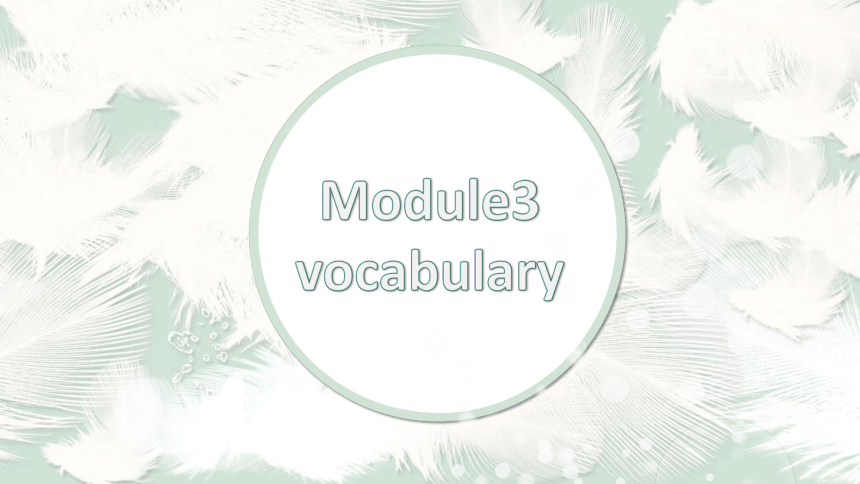
|
|
| 格式 | pptx | ||
| 文件大小 | 12.5MB | ||
| 资源类型 | 教案 | ||
| 版本资源 | 外研版 | ||
| 科目 | 英语 | ||
| 更新时间 | 2022-09-13 14:55:32 | ||
图片预览

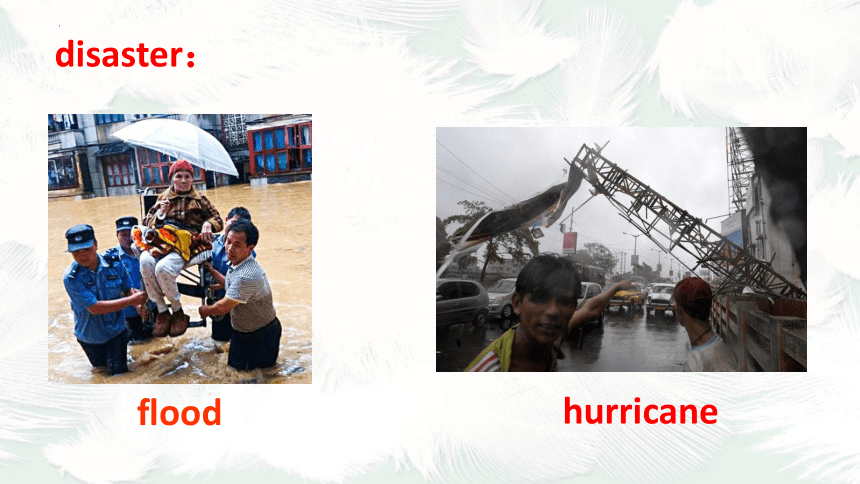
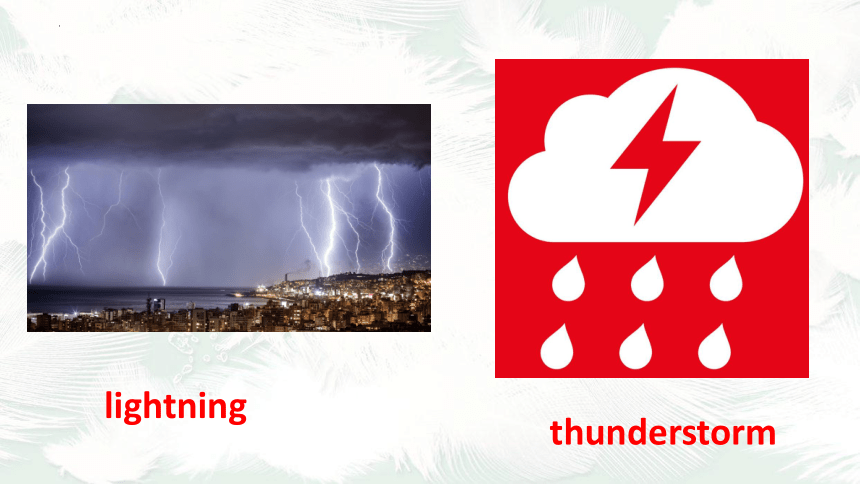




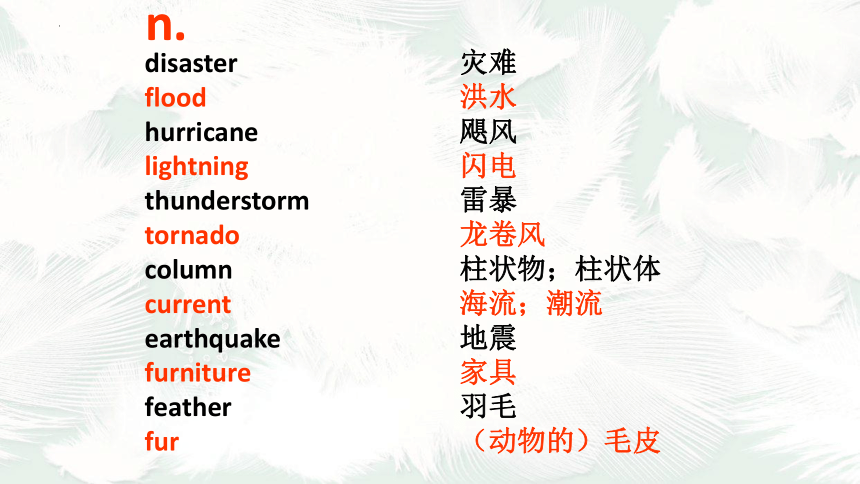
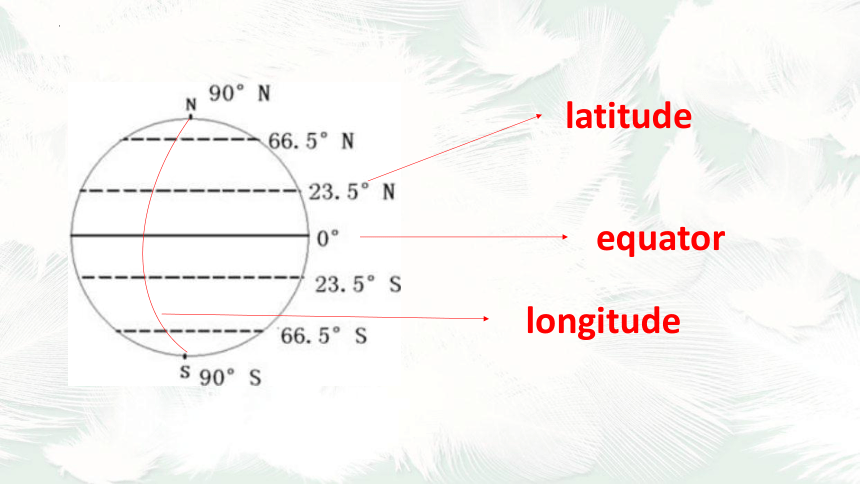

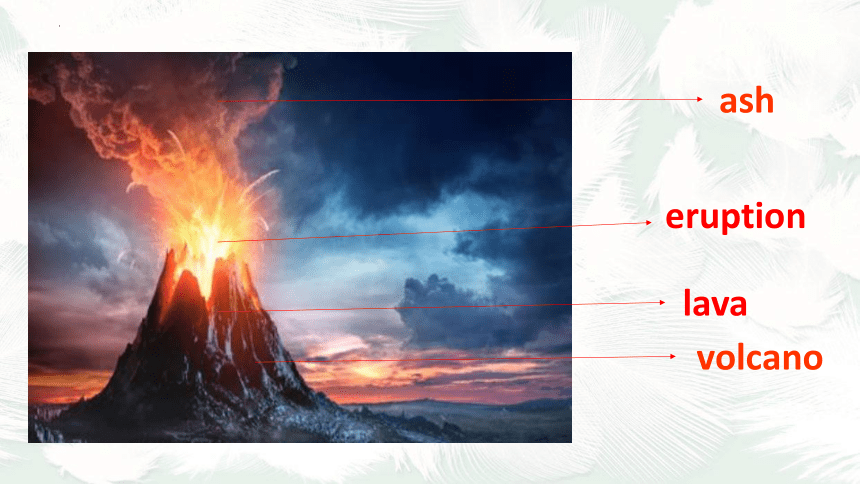
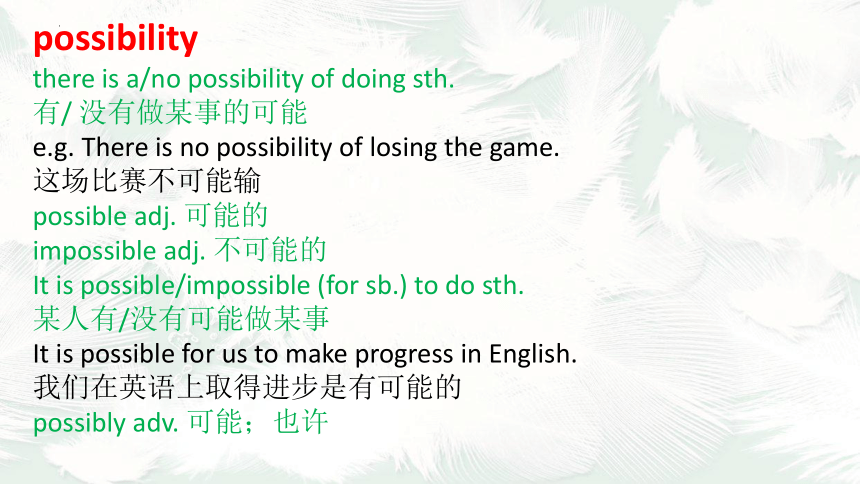
文档简介
(共41张PPT)
Module3
vocabulary
flood
hurricane
disaster:
lightning
thunderstorm
tornado
column
earthquake
current
adj. 现在的
e.g. current prices 现价
furniture
集合名词,不可数名词
many furniture
a piece of/ an article of/ a suit of furniture
一件/一套家具
feather
fur
n.
disaster
flood
hurricane
lightning
thunderstorm
tornado
column
current
earthquake
furniture
feather
fur
灾难
洪水
飓风
闪电
雷暴
龙卷风
柱状物;柱状体
海流;潮流
地震
家具
羽毛
(动物的)毛皮
latitude
equator
longitude
cemetery
coffin
volcano
lava
ash
eruption
possibility
there is a/no possibility of doing sth.
有/ 没有做某事的可能
e.g. There is no possibility of losing the game.
这场比赛不可能输
possible adj. 可能的
impossible adj. 不可能的
It is possible/impossible (for sb.) to do sth.
某人有/没有可能做某事
It is possible for us to make progress in English.
我们在英语上取得进步是有可能的
possibly adv. 可能;也许
warning
n.
equator
cemetery
coffin
ash
lava
volcano
eruption
possibility
latitude
warning
赤道
墓地;公墓
棺材
灰
熔岩;岩浆
火山
(火山的)爆发;喷发
可能;可能性
纬度
警告
experience
vt. 经历;经验
e.g. Have you ever experienced a thunderstorm
你经历过雷暴天气吗?
u.n. 经验;阅历
have experience in… 在……方面有经验
in sb.’s experience 据某人的经验来看
e.g. He has much experience in cooking.
In my experience, breaking comfort zone is possible.
c.n. 往事;经历;感受
完成《情景导学》P29
cause
vt. 引起;导致
cause sth. for sb. 给某人招致某事
cause sb./sth. to do sth 使某人做某事
e.g. Covid-19 caused students to study at home.
新冠病毒使学生们在家学习。
n. 原因;理由
with/without cause 有/没有理由
e.g. people can’t refuse to receive compulsory education without cause.
没有理由,人们就不能拒绝接受义务教育。
cause 指导致某种结果的“原因”,是客观的、自然的
reason 指决定做某一件事或采取某行动的“理由”。
excuse “辩解,借口”,指对某种行为所作的解释,可以是真的,也可以是托词。
【辨析】 “三种理由”
The ________of the accident was that he was driving too careless.
No one knows the ________ why he is absent.
Her ______ didn't go down well; no one believed it.
excuse reason cause
cause
reason
excuse
bury sb in/at... 将某人埋在……
be buried under... 被埋在……下面
bury oneself in = be buried in 埋头……
bury one’s head/face in… 把头/脸埋进……
burial n. 葬礼;埋葬
bury
bury his face in the arms
bury herself in study
= be buries in study
vi.发生
sth. occurs to sb. (主意或想法突然)浮现于脑中,被想起
it occurs to sb. that ... 某人突然想到……
it occurs to sb. to do sth. 某人突然想到要去做某事
A good idea occurred to me when I came into the classroom.
当我进到教室里的时候,我突然想起了一个好主意。
It occurred to me that today is my mother’s birthday.
我忽然想起今天是母亲的生日。
occurrence n. 发生的事情;发生,出现
occur
【辨析】 occur, happen, take place,break out
相同点:三者都可表示“发生”,都属于不及物动词(短语)。
occur 属于正式用语,可以指一件事情的偶然“发生”,也可以指在特定地点或情况下“发生,存在”特定的事情,还可以表示抽象事物的“产生”。
happen 主语是表示事物的词,常用来表示偶然事件的发生。常用于sth. happens/ happened to sb.结构。常用来指预先安排好的、按照计划要“发生”的
take place 常用来指预先安排好的、按照计划要“发生”的事情,一-般没有偶然的意味。
break out 只能用事物作主语,不能用于被动语态,指火灾、战争、地震、海啸等灾难突然发生、突然爆发。
不同点:
【即学即练】
用happen, occur或take place填空。
1. The party will __________ on Friday night.
2. This summer something unfortunate ________ to him.
3. It _______ to him that he didn’t lock the door.
4. Covid-19 ______________ around the world.
take place
happened
occurred
broke out
v.
(疾病、灾难、暴风、雷电)侵袭,爆发
打,击:strike sth. with sth. 用某物击打某物
给人深刻印象: be struck by sth. 被某事打动
突然想起:it strikes sb. that…某人突然想到……
=it occurs to sb. that…
n.
罢工:be on strike在罢工
go on strike举行罢工
strike
strike 打一下或若干下等,不一定都是有意的;还可以表示“敲(钟),报(时)”。
tap 轻轻拍打。
hit “打中”或“对准....来打”,着重敲打或击打对方的某一点。
beat (心脏)跳动,连续地击打、敲击,如殴打或体罚,也可以指在游戏、竞技比赛或战争中击败对手。
【辨析】击;打
ruin
vt. 毁坏
c.n. 废墟(常用作复数形式 ruins)
u.n. 破产;垮台
damage
v./n. 损失;损害
cause/do damage 造成损害
e.g. The earthquake caused a lot of damage to people in Sichuan.
这场地震给四川人民造成了巨大损害。
the damage to…. 对……的损害
e.g. The damage to his reputation is considerable.
他的名誉受到了巨大损害。
damaging adj.造成损害的
damage 指部分损坏、破坏,或使用价值有所降低,但仍可修复或使用。也可用作名词,常与介词to搭配。
destroy 只用作动词,指彻底破坏、毁灭,以至于无法修复,也可以指希望破灭、计划被破坏等。其名词形式是destruction。
ruin 表示破坏严重,以至于不能修复,主要指某物的使用价值遭到了毁坏;也可以用作抽象意义,表示毁灭某人的前途或希望等。也可用作名词。
erupt
vt.(火山的)爆发;喷发
eruption n. 爆发;喷发
v.
experience vt.
cause vt.
bury vt.
occur vi.
strike vt. & n.
ruin vt.
erupt vt.
damage n. & v.
经历
引起;导致
埋葬
发生
(雷电、暴风雨等)袭击
毁坏
(火山的)爆发;喷发
损失;损害
adj.
tropical
rotating
violent
tidal
previous
terrifying
worldwide
active
热带的
旋转地;循环的
猛烈的;激烈的;强烈的
受潮水影响的;有涨落的
以前的
吓人的;可怕的
全世界的
积极的;活跃的
terror n. 恐惧;惊恐
in terror 恐惧地;惊恐地
terrifying adj. 吓人的;可怕的
terrified adj. 害怕的‘惊恐的
terrify vt. 使害怕;使恐惧
adv.
luckily
thankfully
hopefully
sadly
fortunately
幸运地;幸亏
感激地;满怀感谢地
满怀希望地;有希望地
伤心地;不幸地
幸运地;幸亏
1. pick up 是一个多义的短语,常见的意思有:
【拓展】
pick out选出;认出
【即学即练】
说出下列句子中pick up的具体含义。
1. He picked up all the pieces on the floor
when he left the office.
2. Now let’s figure out whose car will stop
to pick us up.
3. Bob has never had a French teacher;he picked the language up by himself in France.
4. My radio can pick up the BBC World
Service very clearly.
捡起
搭载
偶然学会
接收
take off
起飞
脱下;去掉
【拓展】
take away拿走
take back 收回(说错的话)
take up 开始从事;占据
take in 上当
take down 记下
end up 最后(有某种结局);最后(到达某处);结束。如:
If you drive your car like that, you will end up in hospital.
如果你再那样开车,你早晚得进医院。
The little girl took the wrong bus and ended up at a small park.
这个小女孩坐错了车,最后来到了一个小公园。
After about an hour, he finally ended up his speech.
大约一个小时后,他终于结束了自己的演讲。
【拓展】
end (up) as 最后成为
end up with 以……结束
【即学即练】
经过努力,他最后成功了。
He tried his best and ended up with success.
in all 总共;总记
e.g. In all, there are 20 girls in our class.
我们班总共20个女生
【拓展】
above all最重要的是
after all 毕竟;终究
not at all 一点也不
first of all 首先
phrases
pick up
take off
on average
end up
set fire to
catch fire
put out
take place
in all
卷起;掀起
去掉
平均起来
结果为……;以……结束
放火(焚烧)……
着火
扑灭(火)
发生
总共;总计
Module3
vocabulary
flood
hurricane
disaster:
lightning
thunderstorm
tornado
column
earthquake
current
adj. 现在的
e.g. current prices 现价
furniture
集合名词,不可数名词
many furniture
a piece of/ an article of/ a suit of furniture
一件/一套家具
feather
fur
n.
disaster
flood
hurricane
lightning
thunderstorm
tornado
column
current
earthquake
furniture
feather
fur
灾难
洪水
飓风
闪电
雷暴
龙卷风
柱状物;柱状体
海流;潮流
地震
家具
羽毛
(动物的)毛皮
latitude
equator
longitude
cemetery
coffin
volcano
lava
ash
eruption
possibility
there is a/no possibility of doing sth.
有/ 没有做某事的可能
e.g. There is no possibility of losing the game.
这场比赛不可能输
possible adj. 可能的
impossible adj. 不可能的
It is possible/impossible (for sb.) to do sth.
某人有/没有可能做某事
It is possible for us to make progress in English.
我们在英语上取得进步是有可能的
possibly adv. 可能;也许
warning
n.
equator
cemetery
coffin
ash
lava
volcano
eruption
possibility
latitude
warning
赤道
墓地;公墓
棺材
灰
熔岩;岩浆
火山
(火山的)爆发;喷发
可能;可能性
纬度
警告
experience
vt. 经历;经验
e.g. Have you ever experienced a thunderstorm
你经历过雷暴天气吗?
u.n. 经验;阅历
have experience in… 在……方面有经验
in sb.’s experience 据某人的经验来看
e.g. He has much experience in cooking.
In my experience, breaking comfort zone is possible.
c.n. 往事;经历;感受
完成《情景导学》P29
cause
vt. 引起;导致
cause sth. for sb. 给某人招致某事
cause sb./sth. to do sth 使某人做某事
e.g. Covid-19 caused students to study at home.
新冠病毒使学生们在家学习。
n. 原因;理由
with/without cause 有/没有理由
e.g. people can’t refuse to receive compulsory education without cause.
没有理由,人们就不能拒绝接受义务教育。
cause 指导致某种结果的“原因”,是客观的、自然的
reason 指决定做某一件事或采取某行动的“理由”。
excuse “辩解,借口”,指对某种行为所作的解释,可以是真的,也可以是托词。
【辨析】 “三种理由”
The ________of the accident was that he was driving too careless.
No one knows the ________ why he is absent.
Her ______ didn't go down well; no one believed it.
excuse reason cause
cause
reason
excuse
bury sb in/at... 将某人埋在……
be buried under... 被埋在……下面
bury oneself in = be buried in 埋头……
bury one’s head/face in… 把头/脸埋进……
burial n. 葬礼;埋葬
bury
bury his face in the arms
bury herself in study
= be buries in study
vi.发生
sth. occurs to sb. (主意或想法突然)浮现于脑中,被想起
it occurs to sb. that ... 某人突然想到……
it occurs to sb. to do sth. 某人突然想到要去做某事
A good idea occurred to me when I came into the classroom.
当我进到教室里的时候,我突然想起了一个好主意。
It occurred to me that today is my mother’s birthday.
我忽然想起今天是母亲的生日。
occurrence n. 发生的事情;发生,出现
occur
【辨析】 occur, happen, take place,break out
相同点:三者都可表示“发生”,都属于不及物动词(短语)。
occur 属于正式用语,可以指一件事情的偶然“发生”,也可以指在特定地点或情况下“发生,存在”特定的事情,还可以表示抽象事物的“产生”。
happen 主语是表示事物的词,常用来表示偶然事件的发生。常用于sth. happens/ happened to sb.结构。常用来指预先安排好的、按照计划要“发生”的
take place 常用来指预先安排好的、按照计划要“发生”的事情,一-般没有偶然的意味。
break out 只能用事物作主语,不能用于被动语态,指火灾、战争、地震、海啸等灾难突然发生、突然爆发。
不同点:
【即学即练】
用happen, occur或take place填空。
1. The party will __________ on Friday night.
2. This summer something unfortunate ________ to him.
3. It _______ to him that he didn’t lock the door.
4. Covid-19 ______________ around the world.
take place
happened
occurred
broke out
v.
(疾病、灾难、暴风、雷电)侵袭,爆发
打,击:strike sth. with sth. 用某物击打某物
给人深刻印象: be struck by sth. 被某事打动
突然想起:it strikes sb. that…某人突然想到……
=it occurs to sb. that…
n.
罢工:be on strike在罢工
go on strike举行罢工
strike
strike 打一下或若干下等,不一定都是有意的;还可以表示“敲(钟),报(时)”。
tap 轻轻拍打。
hit “打中”或“对准....来打”,着重敲打或击打对方的某一点。
beat (心脏)跳动,连续地击打、敲击,如殴打或体罚,也可以指在游戏、竞技比赛或战争中击败对手。
【辨析】击;打
ruin
vt. 毁坏
c.n. 废墟(常用作复数形式 ruins)
u.n. 破产;垮台
damage
v./n. 损失;损害
cause/do damage 造成损害
e.g. The earthquake caused a lot of damage to people in Sichuan.
这场地震给四川人民造成了巨大损害。
the damage to…. 对……的损害
e.g. The damage to his reputation is considerable.
他的名誉受到了巨大损害。
damaging adj.造成损害的
damage 指部分损坏、破坏,或使用价值有所降低,但仍可修复或使用。也可用作名词,常与介词to搭配。
destroy 只用作动词,指彻底破坏、毁灭,以至于无法修复,也可以指希望破灭、计划被破坏等。其名词形式是destruction。
ruin 表示破坏严重,以至于不能修复,主要指某物的使用价值遭到了毁坏;也可以用作抽象意义,表示毁灭某人的前途或希望等。也可用作名词。
erupt
vt.(火山的)爆发;喷发
eruption n. 爆发;喷发
v.
experience vt.
cause vt.
bury vt.
occur vi.
strike vt. & n.
ruin vt.
erupt vt.
damage n. & v.
经历
引起;导致
埋葬
发生
(雷电、暴风雨等)袭击
毁坏
(火山的)爆发;喷发
损失;损害
adj.
tropical
rotating
violent
tidal
previous
terrifying
worldwide
active
热带的
旋转地;循环的
猛烈的;激烈的;强烈的
受潮水影响的;有涨落的
以前的
吓人的;可怕的
全世界的
积极的;活跃的
terror n. 恐惧;惊恐
in terror 恐惧地;惊恐地
terrifying adj. 吓人的;可怕的
terrified adj. 害怕的‘惊恐的
terrify vt. 使害怕;使恐惧
adv.
luckily
thankfully
hopefully
sadly
fortunately
幸运地;幸亏
感激地;满怀感谢地
满怀希望地;有希望地
伤心地;不幸地
幸运地;幸亏
1. pick up 是一个多义的短语,常见的意思有:
【拓展】
pick out选出;认出
【即学即练】
说出下列句子中pick up的具体含义。
1. He picked up all the pieces on the floor
when he left the office.
2. Now let’s figure out whose car will stop
to pick us up.
3. Bob has never had a French teacher;he picked the language up by himself in France.
4. My radio can pick up the BBC World
Service very clearly.
捡起
搭载
偶然学会
接收
take off
起飞
脱下;去掉
【拓展】
take away拿走
take back 收回(说错的话)
take up 开始从事;占据
take in 上当
take down 记下
end up 最后(有某种结局);最后(到达某处);结束。如:
If you drive your car like that, you will end up in hospital.
如果你再那样开车,你早晚得进医院。
The little girl took the wrong bus and ended up at a small park.
这个小女孩坐错了车,最后来到了一个小公园。
After about an hour, he finally ended up his speech.
大约一个小时后,他终于结束了自己的演讲。
【拓展】
end (up) as 最后成为
end up with 以……结束
【即学即练】
经过努力,他最后成功了。
He tried his best and ended up with success.
in all 总共;总记
e.g. In all, there are 20 girls in our class.
我们班总共20个女生
【拓展】
above all最重要的是
after all 毕竟;终究
not at all 一点也不
first of all 首先
phrases
pick up
take off
on average
end up
set fire to
catch fire
put out
take place
in all
卷起;掀起
去掉
平均起来
结果为……;以……结束
放火(焚烧)……
着火
扑灭(火)
发生
总共;总计
